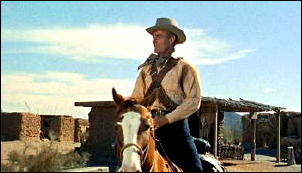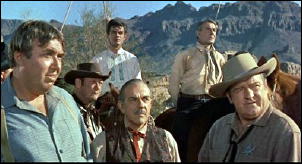Thu 16 Apr 2009
A Western Movie Review by David L. Vineyard: BUCHANAN RIDES ALONE (1958).
Posted by Steve under Reviews , Western movies[2] Comments
by David L. Vineyard.
BUCHANAN RIDES ALONE. Columbia Pictures, 1958. Randolph Scott, Craig Stevens, Barry Kelley, Tol Avery, Peter Whitney. Based on the novel The Name’s Buchanan by Jonas Ward. Directed by Budd Boetticher.

Synopsis: Riding home through the border town of Agry, Tom Buchanan gets caught up in a feud between the lawless Agry brothers and a family of Mexicans.
Buchanan Rides Alone is a key film in the group of films Budd Boettticher did with Randolph Scott in the late 1950’s and is something of a comment on society as a whole. There’s nothing new about the newcomer riding into town and ending up cleaning the place up, but Buchanan goes about it in a singularly tough minded manner.
The characters played by Scott in these films are good men who have been driven by circumstance to become hard, and while they carefully guard a nugget of their humanity beneath that tough exterior they can be ruthlessly violent and even brutal when it’s warranted.
Because Buchanan Rides Alone is the first of a series of books and the character a sort of drifter, there is less backstory than usual in a Boetticher film. Buchanan would seem to be just another drifting cowboy looking for work — until someone pushes him the wrong way.
At that point it becomes clear just how far the Scott hero will go to restore what he considers his personal honor. In some ways his Buchanan has some relationship to John D. MacDonald’s later Travis McGee character, particularly in The Green Ripper. Once he has unleashed the man beneath the surface someone is going to pay in blood before he resumes his easy going facade.
That’s true of most western (and other) heroes but Scott and Boetticher together so refined and perfected the Scott persona in their movies together that they develop a sort of cinematic shorthand, a gesture, a look, a single word, that says more than pages of expository dialogue and background in other films.
In some ways Scott’s take on the iconic western loner is the dominant one in the western imagination, however important the Gary Cooper, John Wayne, or even Clint Eastwood model. Likely the truest moment in Mel Brooks’ Blazing Saddles is when the townfolk remove their hats reverently at the mere mention of Randolph Scott’s name.
Barry Kelly is the corrupt town boss and Craig Stevens (just before Peter Gunn) a smooth gunfighter. There is nothing unusual in the plot, but the writing and direction are as superior as would be expected in a Boetticher film, and while the plot may be tried and true, the approach to character makes this one notable.
The surprising thing about the Boetticher films is that while they are set against the wide open spaces of the west, they are closely focused character studies of men under stress, particularly the Scott hero, who reveals depths of feeling and humanity with little more than a pained look or by holding himself a little apart from everyone else in the film.

I imagined the Buchanan of Jonas Ward’s series of books as someone along the line as Gary Cooper, but Scott at this time was at the height of his appeal, and his take on Buchanan combined a gentle charm that could turn to steel with a glint of his narrow eyes.
And it isn’t as if there weren’t close bonds between Scott and Cooper. Scott got his start in Hollywood as Coooper’s dialogue coach for The Virginian and replaced Cooper in the popular Zane Gray series of films. By the time he made the series of films with Boetticher his version of the western hero was almost as iconic as Cooper’s, though it has only been in recent years he’s gotten real credit as an actor in them.
At first glance Buchanan Rides Alone only seems to be a superior product of the heyday of the adult western, but there is more to the Scott character and to Boetticher’s direction than there may seem to be on the surface.
In the confines of a fairly common western story Boetticher is commenting on both contemporary American society, and also saying something about the idealized American character. Scott’s hero in these films is the man who does the right thing even when it’s messy and society might prefer that he look the other way. Once he is unleashed he will have a reckoning, whatever the price.
[EDITORIAL COMMENT.] A complete list of the “Buchanan” books by Jonas Ward can be found following my review of Buchanan’s Black Sheep, a much later entry in the series. David originally left this movie review as a comment following that earlier post. I’ve revised it slightly for its appearance here.
April 17th, 2009 at 7:11 am
My comments on this odd movie are here: http://billcrider.blogspot.com/2007/06/buchanan-rides-alone.html
April 17th, 2009 at 8:37 pm
I certainly understand Bill Crider and others criticism of Buchanan Rides Alone. All of the Boetticher/Scott team ups are offbeat if not downright odd. They are classic westerns with a twist, and if you don’t like the twist you probably won’t like the films. In The Tall T the relationship between Scott’s cowboy and kidnapper Richard Boone is near homoerotic, with Boone’s character clearly jealous of the growing relationship between Scott and kidnapped Maureen O’Sullivan.
In Comanche Station Scott’s rescue of a woman taken by Indians is almost obsessive and only really becomes clear in the final scene when she is reunited with her husband, and in Ride Lonesome the relationship between bounty hunter Scott and his allies Pernell Roberts and James Coburn is more tense than that between Scott and prisoner James Best, and the end something of an unexpected twist.
Leonard Maltin refers to the Boetticher/Scott films as ‘chamber westerns’, and I think he is close to their appeal and to their oddity. Each of them turns and twists the expectations of the genre and Scott clearly subverts the standard iconic western hero he helped define in earlier films.
I won’t judge whether Scott was bemused or amused by the subtext of the characters, but he had always played a good/bad man in many of his films, and the more complex heroes of the Boetticher films are well within the margins of earlier Scott heroes. In Buchanan he doesn’t come to town as the lawman or the town tamer or even a justice figure so much as a seemingly simple drifting cowboy who finally just won’t stand by and be pushed around or watch others be pushed around though it takes some time for him to rise to the occassion. In that sense it is almost a spoof of the classic slow to anger cowboy hero of an earlier age. I would argue that Buchanan Rides Alone is exactly what it intends to be, right down to the oddball nature of Craig Stevens sophisticated and almost urban gunman.
Still, I’ll grant that if you go into it expecting a standard western you may end up more confused than entertained. I won’t go into the political undercurrent of the film, but there is an implied critique of the iconic American hero (and by suggestion American character) that he will stand by and let the situation get well out of hand before finally stirring himself to act — even when inaction has endangered his own life.
I would also point out that many of these films were scripted by Burt Kennedy who clearly had an offbeat take on the western as evidenced by his own films like Support Your Local Sherrif and The Goodguys and the Badguys. And I would argue the very presence of Scott in the films allowed Boetticher and Kennedy to get away with things a less iconic lead could not.
Buchanan in this film isn’t far removed from the character in The Tall T (based on an Elmore Leonard story), who is a laconic drifting cowboy who ends up a kidnap victim because he lost his horse on a bet he could ride a bronc and promptly got thrown, and thus was on the stagecoach bumming a ride when heiress O’Sullivan and her weak willed cowardly dude husband (John Hubbard)were kidnapped by Boone and his men (Henry Silva, Skip Homeier). As in Buchanan the character shows a willingness to go along with the situation until a crisis rather than the proactive western hero we are used to.
I will offer one film in defense of the idea Scott knew exactly what he was doing, and that is his final film, Peckinpah’s Ride the High Country. In that film Scott is clearly aware of both the elegaic nature and the subtle subversion of the typical western hero he has played throughout his career. That is a subtle and smart performance that shows a clear understanding of both the iconic nature of the cowboy hero and the real world underlying it. And it wouldn’t hurt to keep in mind Scott was also an underrated comic actor who was quite good in screwball comedies like My Favorite Wife or the comedy mystery Home Sweet Homicide (based on the Craig Rice novel). Despite the image of the cowboy Scott was a sophisticated and highly successful businessman.
One story about Scott, that may or may not be true, comes to mind. During the heyday of this western career he was working on a film and dutifully showed up early for filming. When he arrived on set the writer, who had never worked with Scott before, presented him with new pages of script revisions. Scott smiled, accepted the pages, and turned around, got in his car and went home.
The outraged director turned on the writer: “Never give Scott script revisions when he comes to work. He goes home to read them. We always give them to him when he’s leaving for the night.” Strikes me as a man more likely to be amused by what Boetticher was doing than bemused.
But that said, whether someone likes a film or not is more individual than what the director’s intent may have been. There are admittedly great films I don’t care for and admittedly lesser or even bad films I enjoy for whatever reason. I wouldn’t avoid seeing Buchanan Rides Alone based on Bill Crider’s review or seeing it based on mine, but balance the two and decide for yourself if it sounds interesting. In this case critical opinion is largely on my side, but I’m sure there are other films Bill Crider champions and I dislike that the critics favor. Read the two opinions and judge for yourself whether you think you would like Buchanan Rides Alone. In either case I agree with Bill Crider on one point. The film is offbeat, and if you want a more or less standard western, I suggest you watch another film.